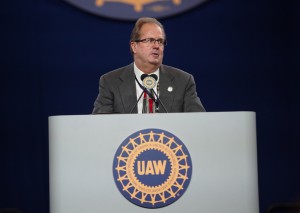
UAW President Gary Jones told members that new investment was needed by automakers to offset the 35,000 union jobs that could be lost to EVs.
The move to electrification could wipe out as many 35,000 jobs in engine and transmission plants operated by the Detroit’s three automakers and their suppliers during the next several years, the UAW suggests.
Jennifer Kelly, the union’s research director, offered up the observations Wednesday during a sobering presentation to the final day of the UAW’s Special Convention on Collective Bargaining.
She noted during presentation the auto industry is rapidly changing and electric vehicles are the wave of the future. Automakers, especially General Motors, are charging hard to advance electric vehicle technology.
“EV powertrains are simple compared to internal combustion engines. The simplicity could reduce the amount of labor, and thus jobs, associated with vehicle production,” she said.
(Top UAW bargainer takes aim at General Motors. Click Here for the story.)
The union, which represents 130,000 hourly workers employed at General Motors, Ford and Fiat Chrysler has to prepare for the change by using its contracts, which are up for re-negotiation this year, to insure the investment flows into plants in where the UAW is present, Kelly said.
“The shift is an opportunity to re-invest in U.S. manufacturing,” she added. “This opportunity will be lost if EV components are imported or made by ‘low road’ suppliers, who under pay workers,” Kelly noted in a white paper that served as the basis of her presentation.
Kelly also noted that China and countries in the European Union are moving aggressively to build plants that will produce batteries for electric vehicles in the years to come.
(Click Here for more about the UAW raising strike pay ahead of Big Three negotiations.)
Gary Jones, who took over as the UAW president this past summer, said the negotiations, which open this summer are vital to the union. “We want new investment,” he said.
“We built the middle class and new we must re-build it,” he said, adding the as the UAW pushes for better wages, more investment in union plants and better working conditions, it cannot count on support from politicians, courts or the National Labor Relations Board, which has been taken over by right-wing Republicans.
Earlier in the week, Jones had sent a not so subtle message to Detroit’s automaker by raising the strike pay for union involved in a labor dispute from to $250 per week from the current $200 per week. The change was effectively immediately and any payments would come from the UAW’s $767 million strike fund.
(To see more about the UAW’s efforts to reverse GM’s decision to close plants, Click Here.)
“We can only rely on each other,” said Jones who also emphasized the union did not want a strike but was preparing for one if the union negotiating teams find it necessary. “No more sending jobs to Mexico without making a sound,” he said.

While it will take some time yet to occur, not only will manufacturing be changed, but the maintenance and repair industry as well.
That, Allen, is a real issue. One potential advantage of electrification — for owners — is the relative simplicity of the drivetrain technology. There have been early issues, particularly with battery packs. Early on, Tesla “bricked” a lot of batteries, but that appears to be a receding concern. No oil changes, minimal regular maintenance and lots less breakdowns. We’ve heard dealers fret and independent mechanics could become a thing of the past.
Paul E.